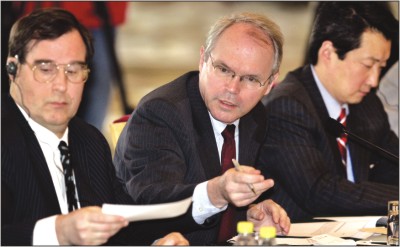Korean Nuke Talks
US has made major concessions
Afp, Seoul
The United States made major concessions to secure a deal yesterday on curbing North Korea's nuclear weapons programme partly to offset foreign policy problems elsewhere, analysts said. US President George W Bush, facing a hostile US Congress and battling a series of international diplomatic reverses in Iran and Iraq, needed to quieten down the North Korea problem, they said. Brian Bridges, a political analyst at Hong Kong's Lingnam University, said a pivotal factor in facilitating the nuclear deal was US domestic politics, notably last year's mid-term congressional elections which produced a Democratic majority hostile to Bush. "Bush's fortunes are at a low ebb at home and with tension mounting in the Middle East and over Iraq and Iran, he was looking for some kind of diplomatic success," he said. Secretary of State Condoleezza Rice had given more flexibility to US negotiator Christopher Hill to hammer out a deal through compromise at the six-party talks in Beijing, he said. Bush, who denounced North Korea as part of an "axis of evil" alongside Iran and Saddam Hussein's Iraq in 2002, even authorised the US side to offer North Korea bilateral talks on forging diplomatic relations. The launch of direct talks aimed at eventually establishing diplomatic ties was part of the joint agreement announced on Tuesday.
|

US Assistant Secretary of State, Christopher Hill (C) attends the closing ceremony of the six-party talks on North Korea's nuclear programme in Beijing's Diaoyutai State Guesthouse yesterday. Host China announced that the six nations involved in talks aimed at ending North Korea's nuclear weapons drive had reached a series of agreements. PHOTO: AFP |